Coronavirus timeline: From a few cases in China to a global pandemic
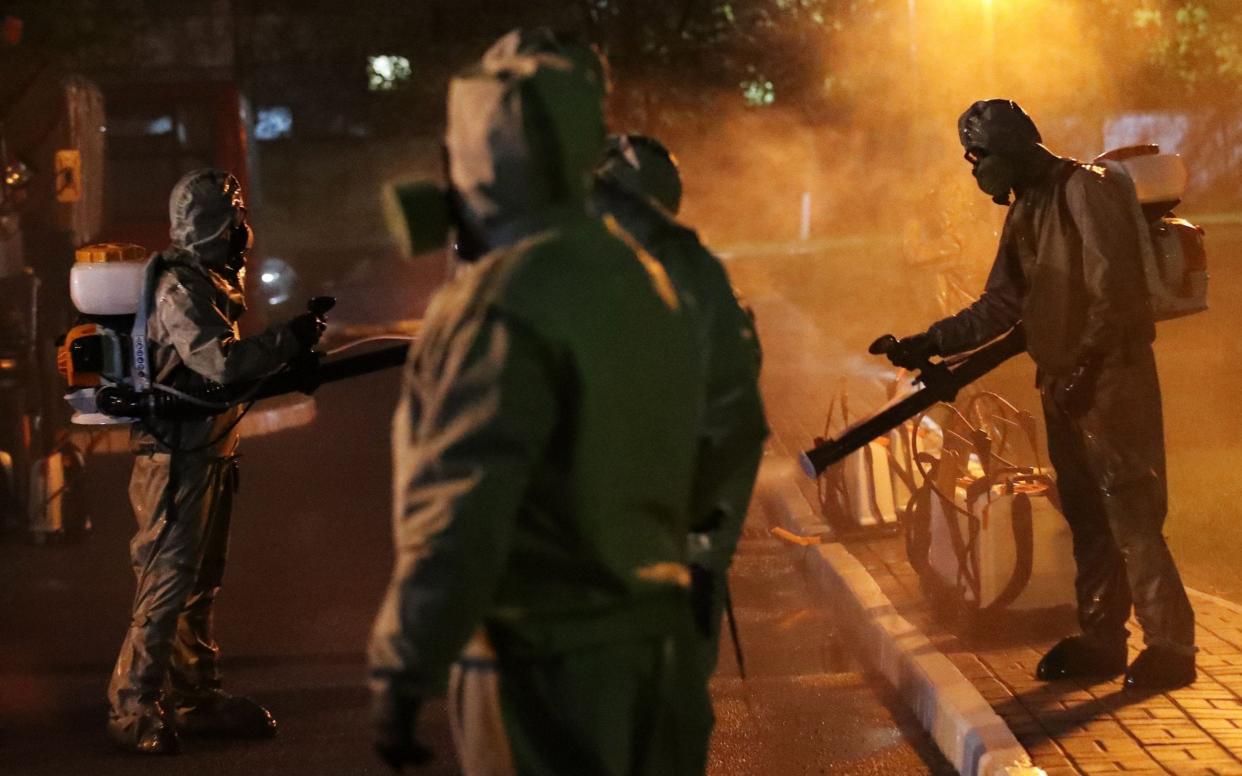

Starting with just a handful of hospital admissions linked to a wet market in China, the new coronavirus (Covid-19) has spread at pace around the world, causing unprecedented social and economic change.
More than five-and-a-half-million people have now been infected globally, with an estimated 342,000 deaths from a virus that has seen many nations enter complete social and economic shutdown whilst trying to curb its spread.
This is the story of how coronavirus went from a few cases in Wuhan to a deadly pandemic affecting more than 200 countries.
December 31, 2019
The World Health Organisation is first notified of a 'pneumonia of unknown cause' by China, The first cases in each first-level Chinese administration was confirmed as occurring between December 12 and December 29.
Huanan seafood market in Wuhan province, which sells both live and dead animals, closed for "regulation" after being identified as a potential source of the outbreak.
Global cases: 266 (estimated), British cases: 0
January 7, 2020
Chinese authorities announced that the pneumonia-like illness is caused by a new type of coronavirus, which the World Health Organisation provisionally names 2019-nCoV.
January 11
The first coronavirus death was announced by the Wuhan Municipal Health Commission - a 63-year-old man who had shopped at the Huanan seafood market.
January 21
The first case in the United States, which had started screening passengers at airports shortly before, was confirmed, which was also the first outside of Asia, as China confirmed that its cases had surpassed 300.
This came a day after Chinese authorities revealed for the first time that the disease can be spread through human-to-human contact, while the World Health Organisation announced plans to meet to consider declaring an emergency.
Coronavirus had at this point spread beyond Wuhan to Beijing and Shanghai, while cases were also reported in Thailand, South Korea, Taiwan and Macau.
January 23
Three cities in China were quarantined, including Wuhan, with 17 people believed to have died of the virus.
January 30
The World Health Organisation declared a global health emergency, but shopped sort of declaring the virus a pandemic, as the China death toll reached 170.
January 31
The number of confirmed cases of coronavirus worldwide surpassed the Sars epidemic, with 9,900 cases now confirmed. Scientists in Hong Kong warned that infections in Wuhan alone are likely to have reached 75,000.
Two patients became the first in the United Kingdom to test positive for coronavirus, including a student at the University of York, as a plane evacuating Britons from Wuhan arrived at RAF Brize Norton and passengers were encouraged to 'self-isolate' for two weeks on arrival.
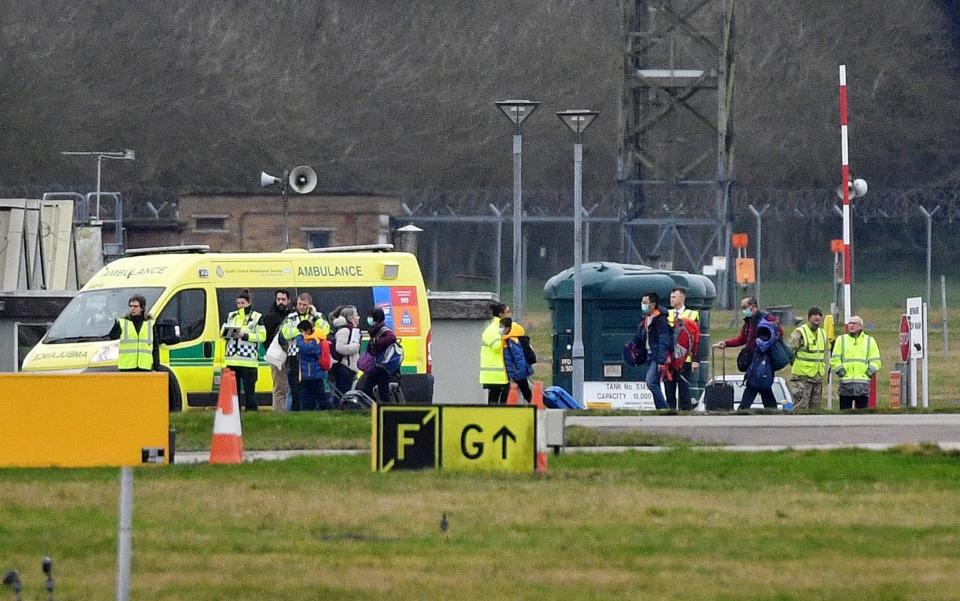
Chief Medical Officer Chris Whitty warned that the epidemic in China was “spreading out of control”, while the first cases of coronavirus in Spain, Sweden and Russia were confirmed. The World Athletics Championships, which were set to take place in China, were postponed by a year.
Global cases: 9,900, British cases: 2
February 2
The first death outside of China is reported in the Phillipines, as lockdown measures in China were increased to cover a total of almost 60 million people. Several countries sent planes to evacuate their citizens from the infection zone in Wuhan, placing travel restrictions or outright bans on mainland China in the process.
February 6
The United Kingdom confirmed a third case of coronavirus, a patient who had visited Singapore a short while before testing positive.
1,000 cases were confirmed in China's Zhejiang province, the first besides Hubei and Wuhan - the latter having reported more than 10,000 cases. Dr Li Wenliang, the Chinese whistleblower who made information public via social media but was accused by his country's police of "spreading rumours", died of the virus.
February 15
The first coronavirus death outside of Asia was confirmed as an 80-year-old Chinese tourist died of the virus in France.
At least 355 passengers on the Diamond Princess cruise liner, which was carrying thousands, were confirmed to have tested positive, making it the largest cluster of cases outside mainland China. Extended quarantines were announced for anyone who has shared a room with someone who has tested positive.

The presence of 78 Britons on the ship sparked domestic concerns that the National Health Service could be overwhelmed by a surge in cases.
Global cases: 67,000, British cases: 15
February 20
Two elderly Japanese passengers died after being taken to hospital from the coronavirus-stricken Diamond Princess ship in Yokohama Port, as on board infections reached 621.
South Korea confirmed its first death from coronavirus, bringing the total to 104, while new cases were also confirmed in Hong Kong, Iran, Japan, Taiwan, and the United States.
February 24
Health experts warned that the world is on the brink of a global pandemic with five further countries announcing their first case and the virus spreading throughout Italy and South Korea at an alarming rate.
Some 50,000 people in more than a dozen Italian towns were placed into quarantine after a huge rise in the number of infections in the country.
South Korea reported more than 160 new cases, making its nationwide total of 763 the largest outside of China. Four Britons rescued from the Diamond Princess ship were treated in specialist facilities in the north of England after testing positive for the virus.
February 27
French President Emmanuel Macron warned that an epidemic was "on the way", as eight new countries repoted their first patients who had tested psoitive. President Trump said the danger to Americans "remains very low".
Pilgrimages in Saudi Arabia were halted and foreign pilgrims banned from entering the country in an unprecedented policy decision.
Australia extended its travel ban on China and put into place its emergency response plan, with Scott Morrison , the prime minister saying there was "every indication" that the world would soon enter a full scale pandemic.
A tour guide in Japan tested positive for coronavirus for a second time, as the Japanese government ordered the nationwide closure of schools and museums for a month.
March 3
The United Kingdom published a contingency plan outlining preparations for the virus to escalate, with 51 cases so far. Tests showed a Spanish man who passed away three weeks ago died of coronavirus, while cases among passengers on the Diamond Princess reached more than 700.
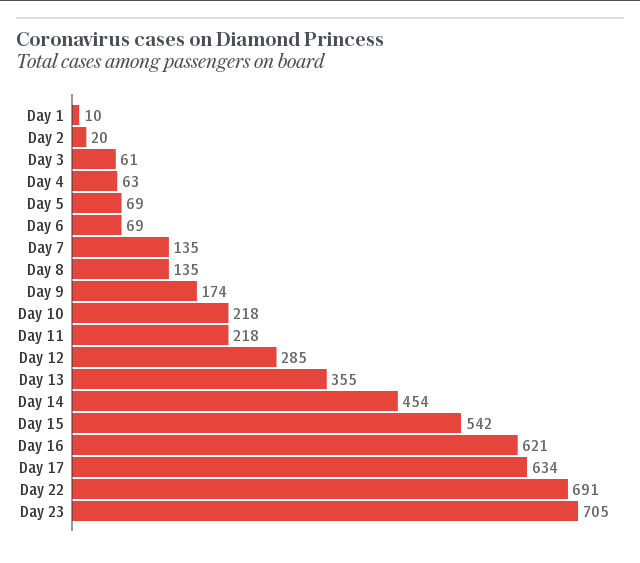
March 9
Italian Prime Minister Guiseppe Conte announced the toughest lockdown so far in Europe. All shops nationwide except for food shops and pharmacies were ordered to close as part of the nationwide measures, stepping up a shutdown which just three days before extended only to some provinces in the north of the country.
'Black Monday' sees severe damage to stocks and shares, the result of the pandemic and worsened by tensions between Russia and Saudi Arabia over oil. Three days later, another drop saw stocks across Europe and North America fall by more than nine percent. Global stocks would see an overall downturn of at least 25% during March.
March 11
The WHO (World Health Organisation) labelled the Covid-19 outbreak a pandemic, acknowledging that it was spreading in multiple countries across the world at the same time. Global cases reached more than 100,000 with more countries continuing to declare rising death and case tolls.
WHO chief Dr Tedros Adhanom Ghebreyesus noted that the number of cases outside China have increased 13-fold in the space of just two weeks, and condemned "alarming" levels of inaction regarding the disease.
Cases in the United States passed 1,000, while in the United Kingdom Nadine Dorries MP announced that she had tested positive.
Global cases: 118,000, British cases: 373
March 13
As the United Kingdom and several other western countries were gripped by panic buying and stockpiling, US President Trump declared a national emergency in the United States, and announced his administration would "open up access to up to $50 billion" in order to respond to the virus.
March 16
The UK's coronavirus death toll rose to 35, with over 1,350 testing positive.
In comments made to the nation, British Prime Minister Boris Johnson urged people to "avoid pubs, clubs, theatres and other such social venues", while encouraging employees to work from home if possible.
March 20
More restrictions were introduced in the United Kingdom as Prime Minister Johnson announces bars, pubs, and restaurants would close with immediate effect. Unprecedented economic measures, including a furlough scheme, were also announced by Chancellor Rishi Sunak to support businesses that will shut up shop.
Italy reported the largest daily increase in deaths since the start of the outbreak, with 627 new fatalities recorded, a day after it overtook China as the country to formally register the most deaths from the disease. This led to further measures being declared by the Italian government, including banning jogging and bicycle rides.
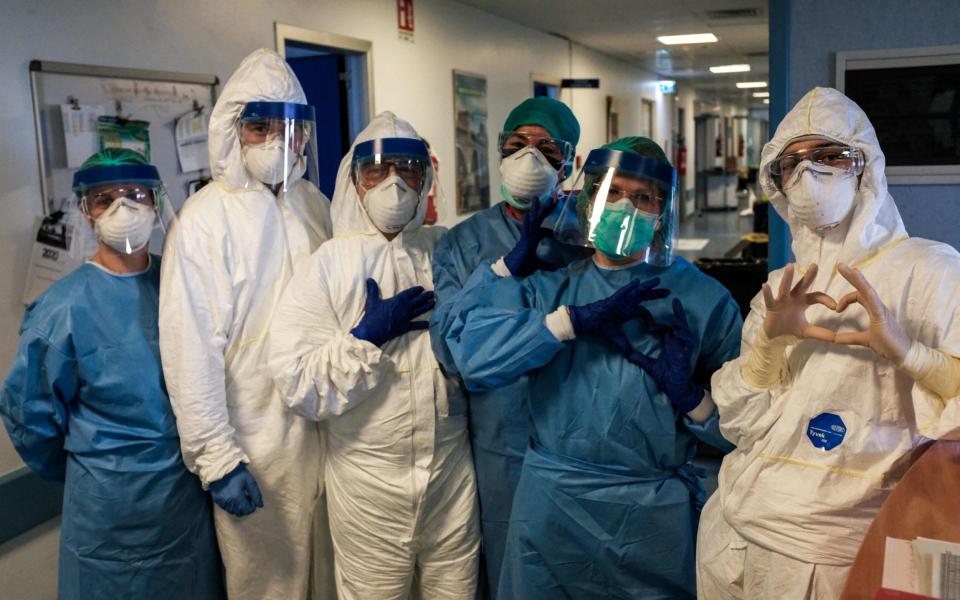
Several states in the United States ordered residents to stay at home, while American scientists said that data from Italy shows the coronavirus death rates in men to be significantly higher than in women.
March 23
In a public address to the nation, the Prime Minister Boris Johnson announced a complete three-week lockdown of the United Kingdom, banning people from leaving their homes except for a few specific reasons and leading to the closure of all non essential businesses.
The Department of Health and Social Care confirmed that cases have passed 6,000, with 335 patients having sadly died in hospital.
India announced that the majority of the country was being placed into lockdown, while President Donald Trump expressed his desire to reopen up the economy in "weeks" despite cases continuing to spiral. John Hopkins University suggests that more than 100,000 people have now recovered from the virus.
Global cases: 378,287, British cases: 6,650
March 25
Deaths from coronavirus in Spain surpassed the official death count in China, with Italy having the most deaths anywhere.
Lawmakers in the US announced a $2 trillion economic stimulus package, as quarantine measures globally continued to be enforced - placing one-third of the world's population into lockdown conditions.
Prince Charles, 71, tested positive for coronavirus, and went into self-isolation at his home in Birkhall, Aberdeenshire.
March 27
France extended its lockdown by more than a fortnight, through to April 15, while Italy recorded its highest rise in daily deaths with 919 fatalities
Health officials in both countries warned that neither had reached the peak of the virus, while the United States overtook Italy and Spain for the highest number of coronavirus cases.
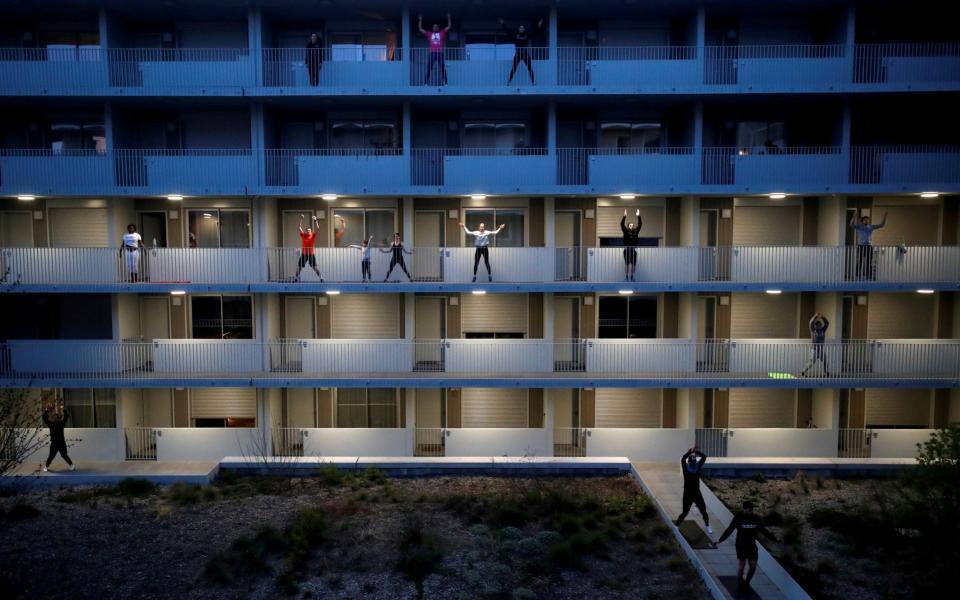
In a video posted on social media, Prime Minister Boris Johnson announced that he has tested positive for coronavirus. This is followed by Health Secretary Matt Hancock also confirming that he tested positive and was self-isolating.
April 3
Confirmed cases globally passed one million, with over 52,000 deaths. 950 people died in the space of a day in Spain, a record number for a European country during the outbreak.
Health Secretary Matt Hancock announced that the UK government aims to carry out 100,000 tests a day in England by the end of the month.
April 6
After his coronavirus symptoms worsened, Prime Minister Johnson was admitted into intensive care where he remained for two days.
British Airways suspended flights to and from Japan, which entered a state of emergency, while confirmed cases in the United Kingdom reached 50,000.
Across Europe, deaths in Spain declined for a fourth day in a row as Italy recorded its lowest death toll in the space of a fortnight and Austria became the first country to tentatively begin to ease lockdown measures.
The US death toll topped 10,000, with the global death toll exceeding 72,000.
Global cases: 1.3 million, British cases: 51,608
April 10
The United Kingdom recorded its deadliest day in the pandemic, with 980 people announced to have died in UK hospitals in the preceding 24 hours, taking the UK total deaths to 8,958 hospital fatalities. Prime Minister Johnson's condition was described as "improving" but he remained in an intensive care unit.
The United States also recorded its highest single-day death toll, with 1,858 fatalities - 806 of which were in New York City, the most stricken part of the country. The death rate in Italy began to slow slightly, with a record day-to-day increase in the number who survived the virus, while some car production in Germany began to restart.
April 13
China reported its highest figure since early March with 108 new cases of the virus, with reports that 98 of these came from overseas as the country faced a new wave of imported infections.
The World Health Organisation said it was looking at reports that coronavirus patients had once again tested positive for the disease despite having clinically recovered. South Korean officials reported 91 patients who were cleared of Covid-19 had tested positive again, with a disease specialist saying the virus could have been 'reactivated'.
April 15
Coronavirus cases hit two million worldwide. The United States remained the epicentre of the pandemic with 636,000 cases, almost a third of all recorded infections.
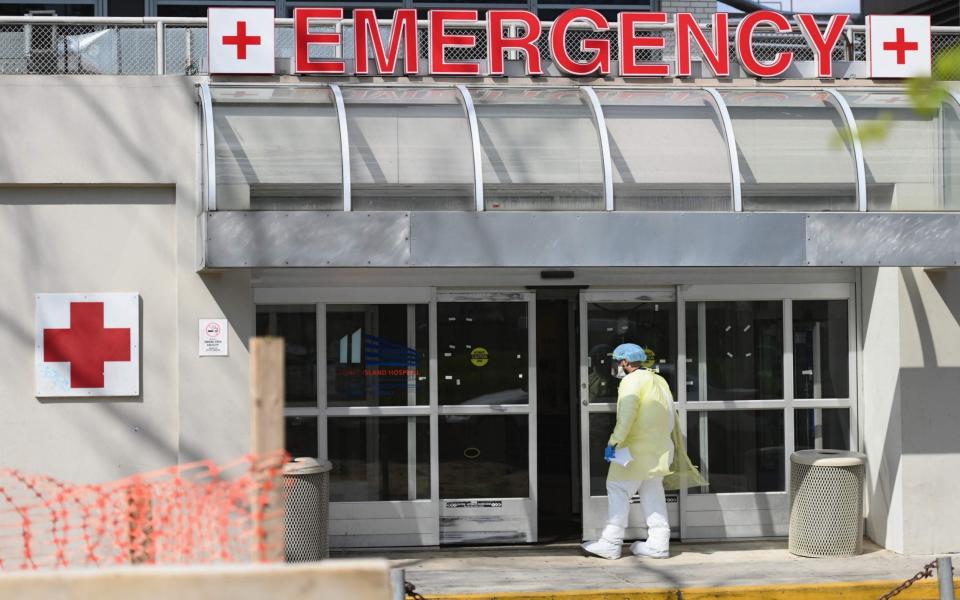
President Trump announced the suspension of funding to the WHO, which on the same day warned that the world was at a "pivotal juncture" in the pandemic, pleading with countries which were easing restrictions to evaluate the consequences of this before any further loosening of lockdown measures.
April 16
Foreign Secretary Dominic Raab, deputising for the Prime Minister, said that the United Kingdom lockdown will remain in place for at least another three weeks, warning that relaxing the lockdown would "risk damage to both public health and the economy". British cases surpassed 100,000, with 13,729 deaths.
The World Health Organization's Europe regional director Hans Kluge reported that cases in Europe amounted to over one million. Italy and Spain started to tentatively lift some restrictions, including laws on some non-essential businesses opening.
Global cases: 2.3 million, British cases: 103,093
April 18
Professor Chris Whitty, Chief Medical Officer, described the idea of life returning to normal anytime soon as "wholly realistic", and said that at least some social distancing measures in the UK would have to continue for the rest of this calendar year at the earliest.
Chile became the first country to issue "immunity cards" to recovered patients, which would exempt them from quarantine measures, while the global death toll reached 150,000 and the European Union warned that almost 100,000 Europeans were still stranded abroad.
April 21
Global deaths passed 170,000 with just under one in four fatalities - 42,000 - taking place in the United States, according to data from Johns Hopkins University. Oil prices collapsed into negative territory for the first time in history.
Figures from the Office for National Statistics showed a third of recent UK deaths were linked to coronavirus, and that fatalities in Britain could be up to 41 per cent higher than those reported by the Department of Health.
Singapore, which was at first praised for its containment of the virus, reported a record 1,426 new cases, with the vast majority foreign workers, confirming a surge in second-wave cases. Hong Kong extended social distancing measures for a further two weeks, despite reporting no new cases for the first time in more than a month.
April 24
Worldwide cases passed 2.7 million, with almost one third of all diagnoses taking place in the United States. President Trump was roundly condemned by medical experts for comments at a press briefing about whether disinfectant could be used to fight the disease, amid signs that many countries would extend social distancing through summer.
At the start of Ramadan, Indonesia enforced strict measures to curb non-essential travel including police road blockades, and mosques closed in Turkey, but restrictions were lifted in Egypt and Algeria for the religious festival.

April 27
The wider scale of the economic damage caused by quarantines became clearer with economists predicting an unemployment rate of more than 16 per cent in America, and a leading forecasting group in the UK stating that it would take up until 2023 for a full recovery to be made.
Roads were blocked and protests took place late into the night in Lebanon, where it was estimated that poverty had risen to 45 per cent because of the lockdown. Its existing economic crisis was compounded further by quarantine and social distancing laws, with its economy forecasted to contract by 12 per cent.

Boris Johnson returned to Downing Street the day before starting work, while more than a million Australians designed a new app designed to help trace the close contacts of coronavirus patients. This came as Australia confirmed it had lowered its infection rate to one per cent, after it had soared to around 25 per cent in March.
April 28
More than three million people have had coronavirus since the start of the outbreak, researchers confirmed, with at least 200,000 deaths globally.

Compensation was announced for workers in the United Kingdom's National Health Service who died of the virus, as debate continued to rage over supplies of personal protective equipment (PPE) on the frontline.
Lockdown conditions began to ease in more American states, while the mayor of Venice warned that Italy was a "social bomb" waiting to explode with anger over the slow pace at which were restrictions being lifted.
Global cases: 3 million, British cases: 161,145
April 30
In his first press conference since being discharged from hospital, Boris Johnson said that the United Kingdom is "past the peak, and on the downward slope" in relation to the virus, and says that he will outline his "road map" for starting to lift lockdown measures next week. Chris Whitty urged caution over a potential second wave of coronavirus infections in winter, warning that this could be worse than the first wave.
Johns Hopkins University confirmed that global fatalities have passed 228,000, with at least 62,000 of these in the United States, followed by Italy and the UK.
A further 3.8 million unemployment claims were filed in the United States, taking the total figure in the space of the last six weeks to over 30 million.
May 2
Primary schools across England will reopen as soon as June 1, The Telegraph revealed, with teachers set to be put on three weeks' notice.
Recorded cases in the United States passed one million, while Australia considered easing its lockdown early after a plateau in infections. Other countries including India and Malaysia also contemplated lifting some restrictions.
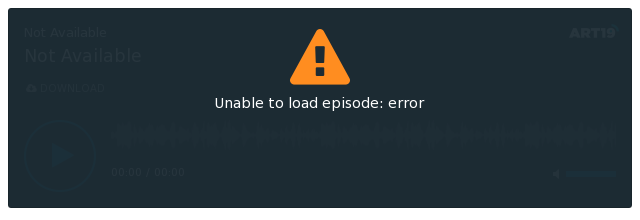
May 4
The UK recorded its lowest number of deaths in all settings since March 30, with 288 fatalities across all settings confirmed.
Italy lifted a significant number of measures, with parks reopening, people now able to visit their relatives, and bars and restaurants permitted to operate a takeaway service. Around four million people went back to work, with face masks mandatory in workplace settings and on public transport systems.
Germany reopened its churches and Spain confirmed its lowest death rate since March.
Russian Prime Minister Mikhail Mishustin said he had been diagnosed with coronavirus as infections in the country reached 155,000, while President Vladimir Putin extended the national 'non-working' month to May 11.
May 5
Latest data from the Office for National Statistics showed that the UK had surpassed Italy and now had the highest official Covid-19 death toll in Europe, with a total of 32,375 deaths.
A contact tracing app went live for NHS staff on the Isle of Wight, to be followed by all 80,000 households on the island receiving a letter on Thursday with details about the app from the chief nurse.
The Health Secretary Matt Hancock said at the government daily briefing: "If you’re watching this and you live on the Isle of Wight, I have a simple message: please, download the app to protect the NHS and save lives."
Government scientist Professor Neil Ferguson resigned from his advisory position after it was revealed that he broke social distancing rules to meet with his married lover.
May 6
The UK became the first country in Europe to record more than 30,000 deaths due to the coronavirus, as Boris Johnson prepared to scrap the Government's "stay home" slogan and gradually begin to lift measures.
UK construction activity plummeted well below expectations, new data showed, with an April reading of 8.2 compared to March’s 39.3 - the worst reading on record by some distance.
French and German service sector performance dropped to new low as historic contractions were seen throughout the Eurozone.
May 7
First Secretary of State Dominic Raab said that while the virus remains deadly and infectious", the Government was now in a position to start thinking about the next phase in the pandemic.
"We can start setting out how we will live and work while maintaining the necessary social distancing rules, and those measures that are still necessary to prevent a second peak," he said, promising clear guidance for businesses and the public.
During a virtual Cabinet meeting, Boris Johnson told ministers that when considering any easing of restrictions the Government would not do anything that risks a second peak.
The Cabinet was updated with SAGE's advice which shows the R (reproduction) rate of the virus is now between 0.5 and 0.9 in the UK.
May 8
The Government missed its testing target of 100,000 for the sixth day running, as a six-week-old baby became the youngest British person to die with Covid-19.
The infant had serious underlying health conditions and had remained in hospital since birth. The baby was among 332 new deaths with coronavirus bringing the total number of confirmed reported deaths in England to 22,765.
May 9
Transport Secretary Grant Shapps announced a £2billion package to put cycling and walking 'at the heart of transport policy'.
He said the first stage would include things such as wider pavements and pop-up cycle lanes and cycle and bus-only streets.
He said the Government was also working with tech firms to develop apps to allow people to “find out what parts of the transport network are overcrowded and avoid them” to maintain social distancing after lockdown.
Meanwhile, the Government unveiled a new message that will ask the country to “stay alert, control the virus and save lives”.
A new five-tier warning system, akin to the scheme used to publicise terror threat levels, will be used to flag up the virus risk and encourage public adherence to the rules.
Global cases: 4,040, 289; deaths: 279, 565. British cases: 215,260; deaths: 31,587.
May 10
In a public address to the nation, Prime Minister Boris Johnson set out a three-step “conditional” plan to ease the lockdown restrictions over the next few months.
The Prime Minister said that from May 13th onwards, there will be no restrictions on the number of times people can exercise outdoors. Driving to other destinations and sunbathing are also permitted.
By June 1st, there will be a “phased” reopening of shops and primary school pupils will be readmitted into school with priority given to those in reception, Year 1 and Year 6.
By July restaurants, bars, pubs and cafes could be reopened along with public spaces.
A newly introduced Covid Alert System is to determine the level of social distancing measures enforced by the government.
In Germany, there were fears that lockdown measures may have been eased too soon as the coronavirus reproduction rate rose to 1.1, giving rise to fears of a second wave of infections days after a series of new measures were introduced.
May 11
The Government published a 50-page "road map" setting out its plan to get Britain out of lockdown, with Boris Johnson writing: "To save lives, we must acknowledge life will be different, at least for the foreseeable future".
New guidance said that members of the public should wear a face covering in crowded places, such as on public transport or in "some shops", adding that homemade cloth coverings can "reduce the risk of transmission in some circumstances".
The dossier said that people working in food production, construction, manufacturing, logistics, distribution, and scientific research in laboratories should go to work if their workplace was open.
Tourist boards including Cumbria Tourism and Visit Cornwall urged people to stay away from to UK destinations after Dominic Raab, the Foreign Secretary, said people could drive "as far as you like" within England while long as they maintained social distancing.
Nicola Sturgeon urged Scots to continued to adhere to 'stay at home' messaging, and revealed that she had asked the UK Government not to roll out its 'Stay Alert' campaign in Scotland.
May 12
The Chancellor Rishi Sunak confirmed that the furlough scheme will be extended until the end of October, a month longer than had been originally anticipated. Mr Sunak told MPs that it will include "greater flexibility" in later months, but workers will continue to receive support at 80 per cent of their current salary up to a monthly cap of £2,500.
Matt Hancock admitted that foreign holidays are unlikely this summer, adding that elderly grandparents may have to be excluded from 'social bubbles' which incorporate one other household.
Data from the Office for National Statistics showed that 41,627 excess deaths in the United Kingdom so far in 2020, three-quarters of which linked to Covid-19.
May 13
The UK recorded its worst economic contraction on record, contracting by 2 per cent in the first quarter of 2020, and experiencing a 5.8 per cent fall in GDP in March alone.
Treasury documents seen by this newspaper forecast that Britain will have a £337 billion budget deficit in 2020, compared to the £55 billion that was forecast in the Budget two months ago..
New police guidance said that police had no powers to enforce two-metre social distancing in England. "Officers should only enforce the Health Protection Regulations – Government guidance is not enforceable," the guidance read.
The European Union unveiled a plan to ease border restrictions in an attempt to salvage tourism throughout summer, outlining new guidance for airlines and hotels while also examining identification checks at borders.
May 14
Analysis from Public Health England and Cambridge University suggested that fewer than 24 people were now catching coronavirus each day in London.
The North-East had 4,000 daily infections and an 'R' rate twice that of the capital, according to the analysis, which prompted MPs to suggest the easing of lockdown measures on a region-by-region basis.
May 15
The Government indicated a shift in its position on the importance of the R-rate after data showed that the infection rate had risen to between 0.7 and one from between 0.5 and 0.9.
Matt Hancock suggested that ministers would accept the figure staying flat, rather than continuously reducing.
The global number of confirmed cases of coronavirus passed 4.5 million, while there was a record increase in new cases in Brazil, and there were fears that the United States would hit 100,000 deaths within weeks.
May 16
Scientists expressed concerns that coronavirus was going undetected in one in four people who exhibit signs of the disease other than an infection or a cough.
Russia recorded its highest daily number of fatalities, while football returned behind closed doors with the resumption of the Bundesliga, the top division in Germany.
A second Brazilian health minister resigned from his post, with the country now recording the fifth highest number of cases in the world.
May 17
170 deaths in all settings were announced in the United Kingdom, the lowest total since the day after lockdown began. While figures are typically lower on Sundays due to reporting variations, the figure was almost 100 fewer than the 268 reported the same time last week.
The number of daily deaths also fell in Spain, dropping to below 100 for the first time since the start of the strict national lockdown.
May 18
The UK added "anosmia" - a loss of taste or smell - to the list of officially recognised symptoms of coronavirus after criticism from a leading epidemiologist. Four of the UK's Chief Medical Officers said that any individual who develops anosmia should now self-isolate. 160 further deaths were announced across all settings.
At the daily briefing, Professor Jonathan Van-Tam, deputy chief medical officer for England, said searches for public transport searches were essentially flat, and pointed to a "definite sustained decline" in new confirmed cases.
Prof. Tim Spector of King's College London told the Today programme that as many as 70,000 cases might have been missed because symptoms including fatigue, muscle pain and loss of taste or smell have not been taken into account.
May 19
The British Medical Association dropped its opposition to schools reopening on June 1, as long as it is "safe to do so".
The Chancellor Rishi Sunak told the House of Lords that Britain was facing a severe recession "the likes of which we have never seen before", whilst scientists at the University of Oxford said that virus deaths in the United Kingdom could cease by the end of June if current trends continue.
May 20
In the House of Commons, Boris Johnson promised that there would be a 'world class' contact tracing programme in place by June 1, the date on which children are set to go back to school.
Data from hospitals in London showed that only a small number of people in the capital were now testing positive for the virus, which the Culture Secretary Oliver Dowden described as 'promising'.
Sweden became the country with the highest coronavirus death rate per capita over the past week, calling the country's decision to avoid a lockdown altogether into question.
May 21
The Scottish First Minister Nicola Sturgeon set out Scotland's 'route map' out its coronavirus lockdown, which will focus on a 'test and protect' strategy based around the testing and isolation of anyone who has symptoms consistent with Covid-19.
From May 28, Scots will be allowed to meet in "small numbers" with members of one household from a social distance while outside. Scottish schools will go back on August 11, the First Minister added, and will use a model of part time in-school, part time at-home learning.
May 22
The Home Secretary Priti Patel announced plans which will require all new arrivals in the United Kingdom to self-isolate for two weeks after June 8, with a limited number of exemptions, including medical and freight workers.
Revealing that new arrivals to the United Kingdom were down 99 per cent on the previous year, the Home Secretary said there will be a fixed £1,000 fine for those who break the self-isolation rule, and that the regulations will be reviewed every three weeks.
Downing Street hinted that lockdown would be lifted first in London before anywhere else in the United Kingdom, while the government's scientific advisory group, Sage, published the key evidence on the safety and impact of reopening schools, saying the risk of coronavirus to returning pupils was "very, very small but... not zero".
May 23
There were calls for the Prime Minister's chief adviser Dominic Cummings to resign after it was reported that he had breached lockdown rules by travelling to his parents' house.
The Transport Secretary Grant Shapps said in the daily Downing Street briefing: "All of the guidance has a common sense element to it which includes safeguarding around adults or children."
Mr Shapps said Cummings had the full support of the Prime Minister, and - appearing to contradict a statement issued by Durham Police - added: "At no stage was he or his family spoken to about this matter."
Deputy Chief Medical Officer Jenny Harries pointed to a "clear downward trend" in both coronavirus deaths and cases in the United Kingdom, and reiterated that self-isolation will be a key element for those identified as contacts once the Government's track and trace strategy is rolled out more widely.
France threatened to retaliate in kind following confirmation that there will be no exceptions to the two-week quarantine rule for French arrivals, while Spain braced to reopen to tourists in July, and Prime Minister Boris Johnson instructed officials to reduce Huawei's involvement in Britain's 5G network in light of the coronavirus outbreak.
Global cases: 5,347,886; deaths: 340,383. British cases: 257,154; deaths: 36,675.
May 24
The Prime Minister Boris Johnson confirmed that Dominic Cummings would stay on as his chief adviser, saying that Mr Cummings "followed the instinct of every father."
He said: "Though there have been many other allegations about what happened when he was in self-isolation thereafter, some of them palpably false, I believe that in every respect he has acted responsibly and legally and with integrity. And with the overwhelming aim of stopping the spread of the virus and saving lives."
Mr Johnson also confirmed that schools will reopen on a phased basis from June 1, with some face-to-face teaching from Year 10 and Year 12 students at a quarter of capacity.
Acknowledging that "full social distancing may not always be possible", he said that guidance would include staggered break time and lunch time periods, plus access to testing for any symptomatic staff or children.
May 25
The Prime Minister used the daily briefing to outline plans for non-essential shops to reopen from June 15, and also announced that the Government intends for outdoor markets and car showrooms to open from 1 June.
In a press conference in the Downing Street rose garden, Dominic Cummings said that he does not regret what he did owing to what he described as his "exceptional circumstances", insisting that he behaved reasonably and legally.
Mr Cummings, who did not apologise and added that he had not considered resigning during the press conference, said: "I knew what the guidance was, it talks about exceptional circumstances with small children."
May 26
A total of more than 5.5 million cases of Covid-19 had at this point been confirmed worldwide, according to data from Johns Hopkins University.
May 27
Boris Johnson announced that the public would be asked to do what he described as its "civic duty" to get the country out of lockdown by self-isolating for up to 14 days if they were found to have come into contact with a coronavirus sufferer, under new manual contact tracing measures to be rolled out from the following day.
May 28
The Prime Minister announced that as of June 1, people would be able to meet with up to five friends at any given time from different households, either in an outdoor public space such as a park or in a garden. Gatherings inside other people's homes remained banned.
"I know the toll that lockdown has taken on families and friends who have been unable to see each other," Boris Johnson said. "So from Monday we will allow up to six people to meet outside - provided those from different households continue strictly to observe social distancing rules by staying two metres apart."
May 29
The Chancellor Rishi Sunak announced the gradual unwinding of the furlough scheme, with employers to pay 60 per cent of wages of furloughed employees by October, with employers being expected topping this up to 80 per cent, as well as once again being given responsibility for pension and national insurance contributions by the autumn.
Updated measures announced by Mr Sunak also included furloughed employees being allowed to return to work on a part-time basis from July.
Greg Clark, the chairman of the Commons science committee, wrote to Prime Minister Boris Johnson asking him to "urgently review" the two-metre social distancing rule following concern about its possible impact on large-scale redundancies.
May 31
Newly released papers from government scientific advisory group Sage showed that routine testing and tracing of contacts was stopped earlier on in the pandemic because Public Health England's systems were struggling to deal with just a handful of cases, with capacity in February thought to have been low as five cases a week.
The estimated 2.2 million Britons who had been instructed to shield on account of their medical vulnerability could go outside from the next day (June 1), it was announced. Restrictions also eased in order to allow shielders to meet one other person from another household as long as they kept two metres apart.
June 1
Children in Reception, Year 1 and Year 6 were allowed back into their classrooms with a number of new rules including social distancing measures that were put in place. Up to 550,000 children were thought to have stayed at home as councils across the country defied ministers by siding with teaching unions and instructing schools not to open.
Coronavirus infection rates in northern regions of England had reached almost double the levels seen in London, a new estimate revealed, while Nicola Sturgeon warned that Scots that she was ready to pass legislation concerning a five-mile travel limit following the flouting of Scotland's new guidelines on the first weekend of lockdown restrictions being eased.
Further relaxations of lockdown in England came into effect, including the updated six-person rule and increased freedoms for those shielding. in addition to the reopening of outdoor markets and car showrooms
June 3
Priti Patel told the House of Commons that from June 8 international arrivals would be subject to a 14-day period of quarantine, and that no air bridges will be considered until June 28.
"We are in a national health emergency right now. This isn't about the inconvenience of certain regulations and measures - we are here to make sure we protect public health first and foremost," she said.
There was however some questioning of the timing and enforcement of the new plans from some Conservative backbenchers including Graham Brady, the chair of the 1922 committee, and former Prime Minister Theresa May.

